Follow Your Different
261 The Future of School with Ted Dintersmith, Bestselling Author of “What School Could Be”
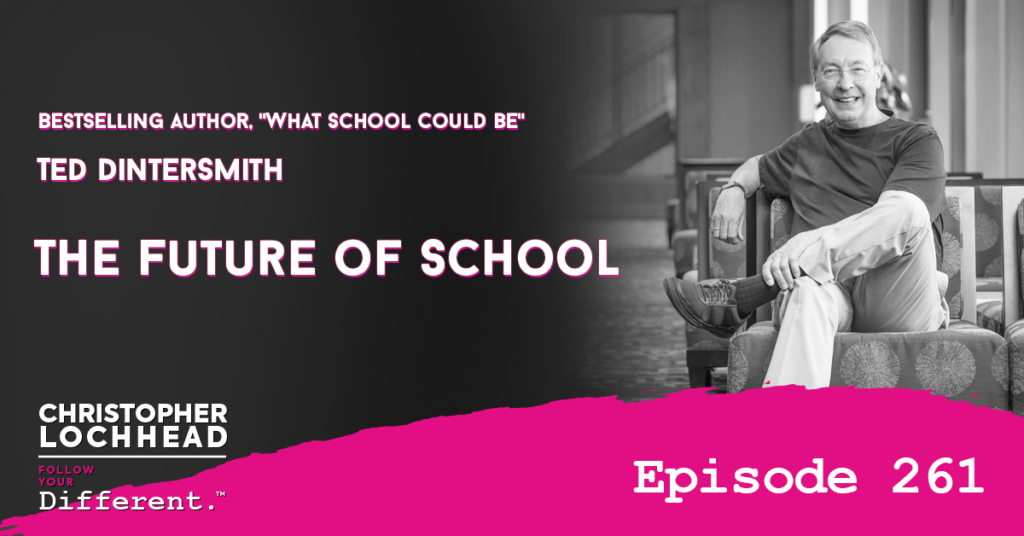
Podcast: Play in new window | Download (Duration: 1:39:13 — 68.1MB) | Embed
Subscribe: Apple Podcasts | Spotify | Pandora | RSS | More
We are currently at the start of a radical change in education of all levels. On this episode of Christopher Lochhead: Follow Your Different, Ted Dintersmith explains what the future of school will be like as the new category of humans begin to shape it anew.
Ted Dintersmith had a career in venture capitalism, but has now dedicated himself in the field of education and improving it. He is the author of a bestselling book, What School Could Be. It is quite an interesting read, and I would recommend you picking it up to learn more about the current state of education.
On this dialogue, we discuss how school can be reimagined, redesigned, and recreated to become legendary. We also discuss what parents, students, and education leaders can do now to develop young people to thrive in the new world.
Also, to hear about my thoughts and position on Spotify and the recent Joe Rogan scandal, please listen to the intro of this episode.
The Current School Systems are Outdated
The dialogue starts as Ted points out how relevant the difference is between Native Digitals and Native Analogs are. If you are not aware what a Native Digital is, check out one of our previous episodes (FYD 250) that talks extensively on the matter.
It is important to recognize the difference, because then you’ll realize that the current school systems are still being run by Native Analogs that prepare students for a world that’s Native Analog. With the rapid growth of technology and the birth of Native Digitals and services that cater to them and them alone, a Native Analog school system will and is slowly becoming obsolete.
The First Step is Recognizing the Problem
The other issue according to Ted, is that when you talk to Native Analogs, they don’t think there’s a profound difference on the matter. Whereas Native Digitals can easily spot the difference.
“You realize that, when you live in a digital world, you have control over what you do. You’re able to go deep on what you’re interested in, the content is either really compelling, or you just switch to something else.
Plop that same kid over into school, and oftentimes, it’s programmed, scripted, boring content that the student has no interest in or voice in, that the teacher really is not that interested in either. But some state legislator, some College Board, or some curriculum writer says, “This is what you got to learn.” And the kids just check out, because I think kids find school boring. They don’t feel they have any real sense of purpose in it. And they know there’s an alternative universe that’s much more compelling.” – Ted Dintersmith
Ted Dintersmith on What School Could Be
The conversation steers to the topic on what the future of school should look like. Ted was then asked this question:
“Besides the baseline subjects such as history, math, science, etc., should the student have the agency to say, “I really want to focus on this or that”?”
Ted shares that he has seen schools that have employed these types of learning system. What he saw was that students were very engaged, and they were easily retaining what they were learning. Also, both student and educator were really excited to be in the classroom every day.
Unfortunately, these school systems were quite rare across classrooms in America.
One issue was the disconnect between what students find enjoyable and engaging, to what the current system thinks the student needs to have a good career when they finish their education. Add to that the rift that growing between Native Analog frameworks and curriculum, and the gap grows bigger.
To hear more from Ted Dintersmith and how we can bring the current school systems to a new era, download and listen to this episode.
Bio
Links
Connect with Ted Dintersmith today!
Website | What School Could Be | LinkedIn
Other Related Links:
Category Pirates: The Digital Education Crisis
NPR: More than 1 Million fewer students are in college
CNBC: More Colleges face bankruptcy but top schools experience record wealth
We hope you enjoyed this episode of Follow Your Different™! Christopher loves hearing from his listeners. Feel free to email him, connect on Facebook, Twitter, Instagram, and subscribe on iTunes!
260 The Raging 2020s: Companies, Countries, People, and the Fight for Our Future with NY Times Bestselling Author Alec Ross
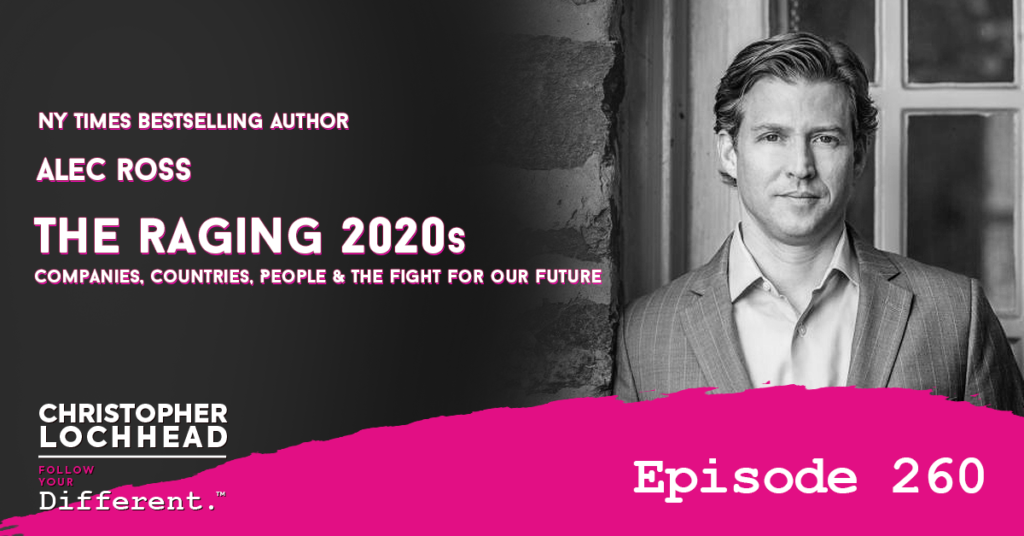
Podcast: Play in new window | Download (Duration: 1:40:51 — 69.2MB) | Embed
Subscribe: Apple Podcasts | Spotify | Pandora | RSS | More
On this episode of Christopher Lochhead: Follow Your Different, we ask the question: Will the future of the United States of America look more like Star Trek or Road Warrior? With us to answer that question is Alec Ross.
Alec Ross is the author of The New York Times bestseller, The Industries of the Future. And he has a brand-new bestseller out called The Raging 2020s: Companies, Countries, People and the Fight for our Future. Alec is a distinguished visiting professor at the University of Bologna business school, and he’s a venture capitalist at Amplo, a global VC firm.
If you have listened to our recent episode with Dr. Cedric Alexander, this dialogue will serve as a great continuation on the State of America (FYD 259), albeit from a different perspective. If you haven’t, why not give it a listen as well?
Alec Ross on Channeling Your Rage
The conversation starts on the topic of Alec Ross’ new book, The Raging 2020s. While the term “raging” often has the connotation of being good, it also can have a bad meaning. While it can denote people having a rolling good time, it can also mean anger, on the verge of violence.
Which is not to say that we should always suppress our anger. For Alec, powerful emotions like that can be a huge part of the creative progress.
“Figuring out how you can harness emotion, anger, volatility, and produce beautiful words, beautiful music, (and/or) beautiful oil on canvas. Also, the greatest athletes are those who know how to focus their rage.” – Alec Ross
For Alec, it’s all about focusing and channeling those powerful emotions into something creative or productive, rather than letting it take over your life.
The Raging 2020s
Exploring further into the book, Alec explains that he wrote The Raging 2020s to show in part why everybody seems so angry right now. As discussed earlier, anger and rage could be channeled into ways that it could be productive. But when the rage becomes more collective, and entire segments of society are angry, what you get is violence.
“I do feel like a lot, there is rage coming right now in America, both from the parts of America that have nothing to lose, as well of those parts of America that have something to protect, and believe that they can’t necessarily grow what they have.” – Alec Ross
Oftentimes, this is what happens when the when there isn’t a shared sense of what we can get together. For Alec, it is something both interesting yet terrifying to observe.
Star Trek or Mad Max?
Alec then talks about the question that is in the heart of his new book. Which is, will our future look more like Mad Max, or Star Trek?
If you aren’t familiar, Star Trek is set on a future where humanity has reached for the stars and enjoys continued progress and abundance. Whereas in Mad Max, we get a dystopian future with scarce resources and chaos all around.
Alec says the future is entirely up to us.
“The degree to which the future does look more like Star Trek or more like Mad Max, is entirely up to us. And I do think that if you have a mindset and an approach that’s rooted in production and creation, as opposed to destruction, that’s the beginning of any sort of progress.” – Alec Ross
To hear more from Alec Ross and how the United States of America will end up in the future, download and listen to this episode.
Bio
Alec Ross is a New York Times best-selling author and Distinguished Visiting Professor at l’Universitá di Bologna Business School.
He is the author of the recently published The Raging 2020s: Companies, Countries, People and the Fight for Our Future.
His prior book The Industries of the Future has been translated into 24 languages and been a best-seller on 5 continents.
He is a Board Partner at Amplo, a global venture capital firm and sits on the board of directors or advisors for companies in the fields of technology, finance, education, human capital and cybersecurity.
He is also an adviser to investors, start-ups and government leaders to help them understand the implication of macro factors emerging at the intersection of geopolitics, markets and increasingly disruptive network technologies.
Specialties include: international market development, executive coaching, cybersecurity, consumer Internet, and board governance.
Recognitions include:
- Named one of Top 100 Global Thinkers by Foreign Policy Magazine
- S. Department of State Distinguished Honor Award
- Oxford University Internet & Society Award
- Huffington Post’s 10 Game Changers in Politics
- Tribeca Film Festival Disruptive Innovation Award honoree
Links
Connect with Alec Ross!
Website | Twitter | LinkedIn | Amazon Books
We hope you enjoyed this episode of Follow Your Different™! Christopher loves hearing from his listeners. Feel free to email him, connect on Facebook, Twitter, Instagram, and subscribe on iTunes!
259 The State of America with Dr. Cedric Alexander, Former Police Chief & President of the National Organization of Black Law Enforcement Executives
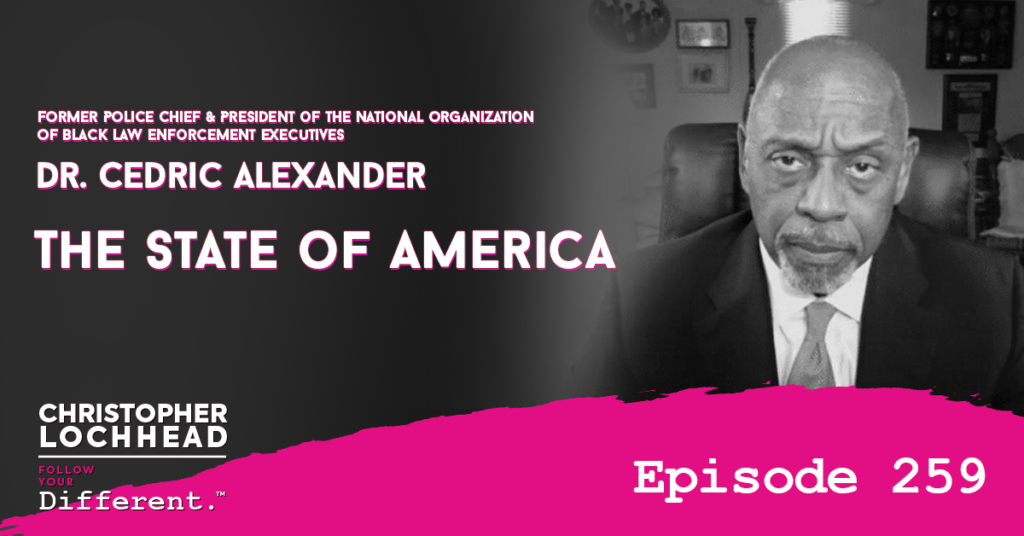
Podcast: Play in new window | Download (Duration: 1:00:47 — 41.7MB) | Embed
Subscribe: Apple Podcasts | Spotify | Pandora | RSS | More
On today’s special episode of Christopher Lochhead: Follow Your Different, we have a deep conversation about the State of America. The United States of America is facing some meaningful challenges right now, and who better to help us unravel everything than Dr. Cedric Alexander.
Dr. Cedric Alexander had a 40-year career in policing, public service, and mental health. He is the former police chief and Public Safety Director in DeKalb County, Georgia. He is also the former police chief of Rochester, New York, where he served as the federal security director in the TSA. Dr. Alexander also served on President Obama’s Task Force on 21st century policing. He is also the author of the hit book, The New Guardians: Policing in America’s Communities for the 21st century.
Now, you often see Dr. Alexander on TV, or even up on a stage giving a speech. But unlike the TV where you only get a few minutes with him, today we go deep in an incredibly thoughtful conversation in a way that you only can on a real dialogue podcast.
Dr. Cedric Alexander on the Upcoming Elections
The conversation started off on the topic of the upcoming midterms on 2022, and the subsequent presidential election on 2024. Particularly, on whether people could expect violence during these times, with regards to the events that unfolded last election.
Being a former lawman himself, Dr. Cedric Alexander can’t help but think about it as well. With regards to what happened in the 6th of January in 2021, it has certainly created a great deal of pause and concern for the country.
As for his perspective, Dr. Alexander thinks that there is too much politics and taking sides involved that the Right and the Left are so divided. He finds it difficult to take sides with one or the other, because his concern and ideas require both sides to work together to fix the nation.
“It’s very difficult to me for me to take sides with one over the other, because I think politics get played all the way around. What I’m concerned about is not their politics, but this nation as we know it.” – Dr. Cedric Alexander
Sit Down and Talk
When asked if there is a chance for both sides to have a more civil dialogue as opposed to inciting violence whenever they don’t get the desired results, Dr. Alexander has this to say:
“My thought is that both sides of the aisle, in my humble opinion, struggle for good leadership. Leadership that is not grounded in the party you belong to. Leadership that is grounded in the fact that we have to work together to find a way, or we’re going to continue to be in this very risky posture that we are in right now. “ – Dr. Cedric Alexander
In order to avoid a repeat of what happened on January 6, it’s going to take leadership coming from both sides of the aisle. Not political leadership, but humanistic leadership. A leadership with proper morals, and one that comes from the heart.
The Perpetuation of the Election Fraud Claims
They then talk briefly about the continuous perpetuation that the election was stolen, despite numerous proofs and actual recounts done in some states.
Dr. Alexander says that this is a dangerous precedent.
“We’re almost at a point where even if I show you that clear evidence of anything, is still not believed. That is dangerous, brother.” – Dr. Cedric Alexander
According to him, this also all boils down to leadership problems, as some of the leaders themselves are perpetuating this belief, in order to curry favor or not be ostracized by their party.
To hear more from Dr. Cedric Alexander and the State of America, download and listen to this episode.
Bio
Dr. Cedric L. Alexander
A visionary leader who has served over four decades in law enforcement and public service, there’s few more qualified to speak on the growing strife between race, communities, and the police.
In his frequent, high profile commentary on CNN’s Amanpour, NBC News, and MSNBC, he poses the hard questions about systemic racism in our country and the need for police reform.
Dr. Alexander remains front and center on these issues that have inflamed our nation.
He speaks out on the violence while providing concrete solutions about how to navigate these troubled waters to address the problems plaguing law enforcement and the communities of color they serve.
Dr. Alexander brings to the conversation lengthy experience as the former Chief of Police in DeKalb County, GA, President of the National Organization of Black Law Enforcement Executives, and member of President Obama’s Task Force on 21st Century Policing. Throughout his career, he has been pivotal in reforming troubled police departments and restoring trust between them and their communities.
He is also the author of In Defense of Public Service: How 22 Million Government Workers Will Save Our Republic that features endorsements from the late U.S. Representative Elijah Cummings, Retired Major General James “Spider” Marks, and attorney Barry Scheck from the Innocence Project.
His insight into the non-elected “fourth branch” of government—our nation’s public servants, civil servants, and first responders—as those who will save the nation by helping bring our greatly divided society together is uncanny during today’s times.
Cedric has testified before the House Oversight and Reform Committee on Facial Recognition Technology, as well as on the pros and cons of using body cameras, drones, and crime mapping in law enforcement.
He sits on the board of the Innocence Project, working to exonerate the wrongly convicted through DNA testing and reforming the criminal justice system to prevent future injustice.
He is also consulting with companies such as AT&T FirstNet, the first nationwide network dedicated to public safety to help law enforcement, fire service, and EMS do their jobs safely and effectively.
With a doctorate in clinical psychology from Wright State University, Cedric is equipped to address the prevailing issues nationwide. In every situation, he conveys a sharp understanding of human nature, the breadth of issues facing our communities, and how to break through to create a solution everyone can unite behind. Widely respected for his ability to lead thoughtfully and respectfully, he transcends both public and private sectors in an effort to foster positive change.
Links
Linkedin: in/CedricLAlexanderPsyD
Twitter: @CAlexLaw
Amazon Books: The New Guardians
Other information about Dr. Cedric Alexander:
This is a Job for Cedric Alexander
Dr. Cedric Alexander on Capitol Security
We hope you enjoyed this episode of Follow Your Different™! Christopher loves hearing from his listeners. Feel free to email him, connect on Facebook, Twitter, Instagram, and subscribe on iTunes!
258 Get It Done: Surprising Lessons from the Science of Motivation with Ayelet Fishbach, PhD
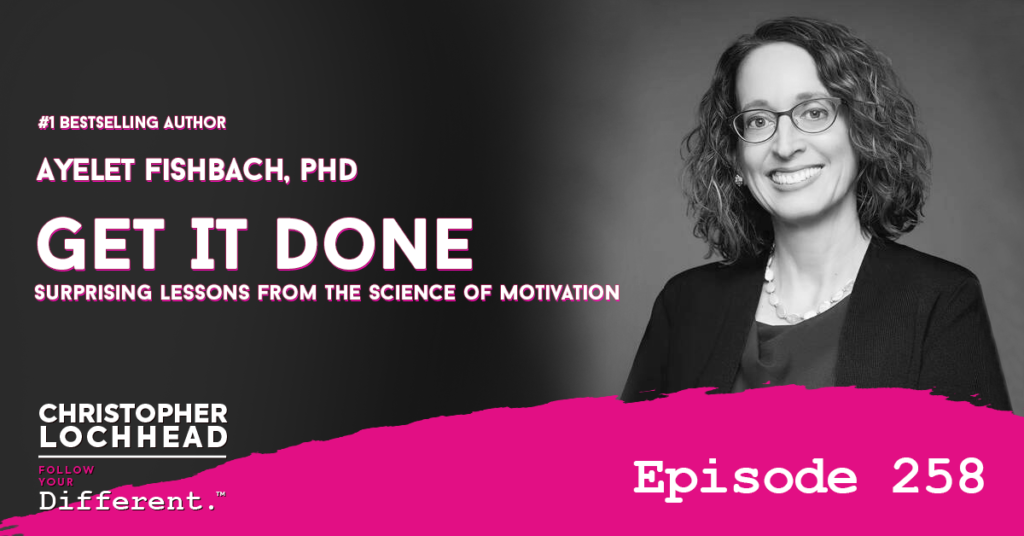
Podcast: Play in new window | Download (Duration: 1:25:14 — 58.5MB) | Embed
Subscribe: Apple Podcasts | Spotify | Pandora | RSS | More
What is the source of human motivation? In this episode of Christopher Lochhead: Follow Your Different, Dr. Ayelet Fishbach shares the real science behind what motivates people to get things done.
Dr. Ayelet Fischbach is the author of the no.1 bestselling and deeply researched book, Get It Done: Surprising lessons from the science of motivation. She is an award-winning psychologist at the University of Chicago Booth School of Business and the past president of the Society for the Study of Motivation.
What you are about to hear is a powerful dialogue about what it really takes to get and stay motivated, and ultimately get it done.
Dr. Ayelet Fischbach on Tying Productivity with Activity
The conversation starts with Christopher commenting that he feels that he has been less productive compared to his previous career. This was mostly due to his past work being so fast-paced and packed with activity, that he feels he is not as effective as he once was.
Dr. Fishbach responds that this is something that people often get confused about, which is associating productivity with activity. Sometimes people bombard themselves with a lot mundane tasks and call it a productive day, rather than getting something meaningful done that actually makes progress.
“If you took the day to think about a new idea, if you had a new idea for a book today, that would play an incredible day, right? Like, these are the best days for you. And they don’t involve their eight meetings. Back-to-back meetings are often a waste of time and we just fill up our time with all this nonsense.” – Dr. Ayelet Fishbach
You Can’t Put a Schedule on Creativity
One of the things that can be hard to put a schedule on is getting the motivation or inspiration to be creative. You could of course schedule times where you can get yourself in the “zone” to be creative, but it is not a guaranteed thing most of the time.
Dr. Fishbach agrees with this, and says that sometimes, you need to allot time and bandwidth for it to happen. This means that you might have to allow big chunks of your day on just letting your mind think. You might even have to shelve it for later, or sleep on an idea to let it develop further in your head.
“Well, creativity requires that you are able to sleep on something that you are able to, to think about it without reaching a conclusion without having the solution yet.” – Dr. Ayelet Fishbach
Dr. Ayelet Fishbach on the Definition of being Productive
That being said, what is the definition of being productive or effective? What does it mean to get things done?
To answer this, Dr. Fishbach shares the story behind her book’s cover. While thinking of a cover for her book, one of the designs her publisher presented had a to-do list. Dr. Fishbach said that that particular design would not work. Because for her, being productive does not mean having a to-do list.
“(Having a list) is not what I mean by getting things done. (You start off by) thinking about what goals are important for you. Okay, what gets priority? Is it your creativity? Is it taking care of something, of someone, and how these goals work with each other? So we start by identifying where we want to be, what we want to do, and then that the second element is monitoring your progress.
The third element is managing all the other things that are going on in your life. You never want just one thing. So what happens with the rest?
And the fourth is gathering social support. Who in your life is helping you? Who stands in the way? How do you get closer to the people that are helping you be the person that you want to be? This is a very broad overview of the framework of my world, the book, Get it Done, and not the to-do list.” – Dr. Ayelet Fishbach
To hear more from Dr. Ayelet Fishbach and how you can get things done, download and listen to this episode.
Bio
Dr. Ayelet Fishbach studies social psychology, management and consumer behavior. She is an expert on motivation and decision making. She has presented her research all over the world.
Dr. Fishbach’s research has been published in psychology, management and marketing journals, including Psychological Review, Journal of Consumer Research, Journal of Experimental Psychology: General, Journal of Marketing Research, Psychological Science, and the Journal of Personality and Social Psychology. Her research is regularly featured in the media, including WSJ, CNN, Chicago Tribune, NPR and was selected to be featured in the New York Times ‘Annual Years in Ideas.’
Dr. Fishbach has served as an Associate Editor on several journals, including Psychological Science and the Journal of Personality and Social Psychology, and she has served on the editorial board of leading journals in psychology and management. She has further served as the president of the International Social Cognition Network (ISCON) and the Society for the Study of Motivation.
Dr. Fishbach is the recipient of several international awards, including the Society of Experimental Social Psychology’s Best Dissertation Award, Career Trajectory Award, and the Fulbright Educational Foundation Award. In 2006, she received the Provost’s Teaching Award from the University of Chicago.
Dr. Fishbach earned a bachelor’s degree with distinction in psychology in 1992, a master’s degree summa cum laude in psychology in 1995, and a PhD magna cum laude in psychology in 1999, all from Tel Aviv University. She joined the Chicago Booth faculty in 2002.
Links
Connect with Dr. Ayelet Fishbach!
About Dr. Ayelet Fishbach | LinkedIn | Twitter | Amazon Books
We hope you enjoyed this episode of Follow Your Different™! Christopher loves hearing from his listeners. Feel free to email him, connect on Facebook, Twitter, Instagram, and subscribe on iTunes!
257 How Entrepreneurs Change Lives & Communities with “IRON” Mike Steadman; Marine Officer, Boxing Champion & Veteran Entrepreneur Advocate
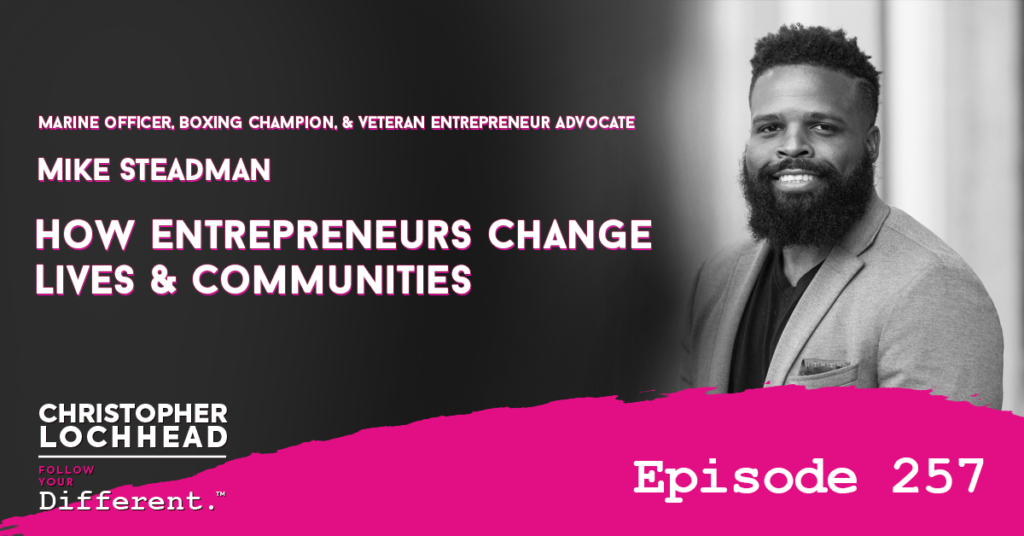
Podcast: Play in new window | Download (Duration: 1:54:18 — 78.5MB) | Embed
Subscribe: Apple Podcasts | Spotify | Pandora | RSS | More
For some, entrepreneurship is a way up in the world. For others, it’s a way out of their current situation. But no matter what the motivation, entrepreneurship is ultimately an opportunity to create a different future. Not only for the entrepreneur themselves, but for their customers, employees, and ultimately an entire community. This is the reason why me and our guest, “IRON” Mike Steadman, love entrepreneurship.
“IRON” Mike Steadman is a retired combat Marine officer. He is also a three-time National Collegiate boxing champion in the military. He’s the founder of Iron Bound Boxing and Education, which is a non-profit in New Jersey. He also founded a company called Dog Whistle Branding, a marketing agency that helps veteran-owned businesses with podcasting, brand, and category design.
In this episode of Christopher Lochhead: Follow Your Different, we have a dialogue with “IRON” Mike Steadman as we talk about all things entrepreneurship, including topics such as helping veteran entrepreneurs. This is a conversation you’re going to find incredibly inspiring and empowering, so stay tuned.
“IRON” Mike Steadman on Losing the Ability to Communicate
The conversation starts as Mike responds to a comment about sounding like a podcaster. He shares that being a podcaster helped him become better at public speaking. Now, when he does interviews, people are surprised on how Mike can do it all in one take.
Nowadays, being able to communicate with each other in a clear and articulate way seems like an outlier than the norm. Mike thinks that this is due to the internet and the anonymity it provides, that we lost something essential when talking to other people.
“I think we’re struggling with it. It’s because we’ve lost the ability to communicate with empathy. That’s the thing, right? You can communicate, share your opinion, or something. But you can also be an asshole about it. And I don’t think we are very empathetic anymore.” – Mike Steadman
“IRON” Mike Steadman on being the Loudest in a Conversation
One of the problems we have with communicating nowadays is that there seems to be a lot of yelling going on. Some do it mostly for attention, others to push their ideas further than the others.
For Mike, it’s a matter of respecting the people you are conversing with.
“If you’re the loudest person in the room, you’re also the weakest person in the room. And sometimes I think yelling is, I don’t want to call it a cop out, right? But yelling is we just write (comments), we don’t know how to communicate. We don’t know how to respect people’s opinion.” – Mike Steadman
“IRON” Mike Steadman on Social Media
It is ironic that “social media” has made a lot of people antisocial. Mike thinks it is because people find it easier to just hide behind a computer screen and interact with people that way.
Unfortunately, some people who start a business has the same mindset. But for Mike, it’s just not the best way to do things. Regardless of whether you’re doing things digitally or analog, you still need to communicate with people properly and build proper relationships with them.
“I’ve been saying (that) business is a contact sport. Unfortunately, I think a lot of the generation now when they start a business, they think they can just go on social media. But human to human, you still have to look someone in the eye (and) talk to him convey your value. And I think the default (now) is social media. Even dating girls, the default is an app. So I think we have lost the ability to communicate, actually.” – Mike Steadman
To hear more from “IRON” Mike Steadman and how Social Media is both the cause and the cure for proper communication, as well as how he helps veteran entrepreneurs connect with the current market, download and listen to this episode.
Bio
“IRON” Mike Steadman is a serial entrepreneur based in Newark, NJ, who’s committed to improving the economic and social outcomes of urban youth and military veterans through boxing, entrepreneurship, and new media.
He’s the Founder and CEO of IRONBOUND Boxing, a nonprofit that provides free amateur boxing training, entrepreneur education, and employment opportunities for Newark youth & young adults.
Mike and his partner Keith Colon, oversee the legendary IRONBOUND Boxing Academy, their free boxing gym for youth in Newark, NJ. He also runs IRONBOUND Media, a podcast production company that produces branded podcasts for veteran-owned businesses.
Mike is a three-time National Collegiate Boxing Champion from the United States
Naval Academy and Marine Corps Infantry Officer, with deployments to Afghanistan and Japan/Philippines. He’s currently a Hoover Veteran Fellow at Stanford University’s Hoover Institution, a public policy think tank promoting the principles of individual, economic, and political freedom.
His goal is to raise 1.5 million dollars to build the ever IRONBOUND Courage Academy, a 5,000 sqft boxing facility and small business incubator space for Newark’s youth and young adults.
Through his efforts growing IRONBOUND Boxing and IRONBOUND Media, Mike has established himself as a high-profile veteran advocate and the new face of social entrepreneurship.
To learn more visit www.IRONBOUNDBoxing.org and www.IRONBOUNDMedia.com.
To learn about IRONBOUND Boxing and our efforts in Newark, please visit www.Ironboundboxing.org
Mike is also a Hoover Institute Veteran Fellow.
Links
Follow “IRON” Mike Steadman!
Website: IronboundBoxing.org | IronboundMedia.com | DogWhistleBranding.com
Linkedin: in/Iron-Mike-Steadman
Instagram: @IronMikeSteadman
We hope you enjoyed this episode of Follow Your Different™! Christopher loves hearing from his listeners. Feel free to email him, connect on Facebook, Twitter, Instagram, and subscribe on iTunes!
256 Mission Driven: Saving Lives in Afghanistan with Valerie Edmondson Bolaños
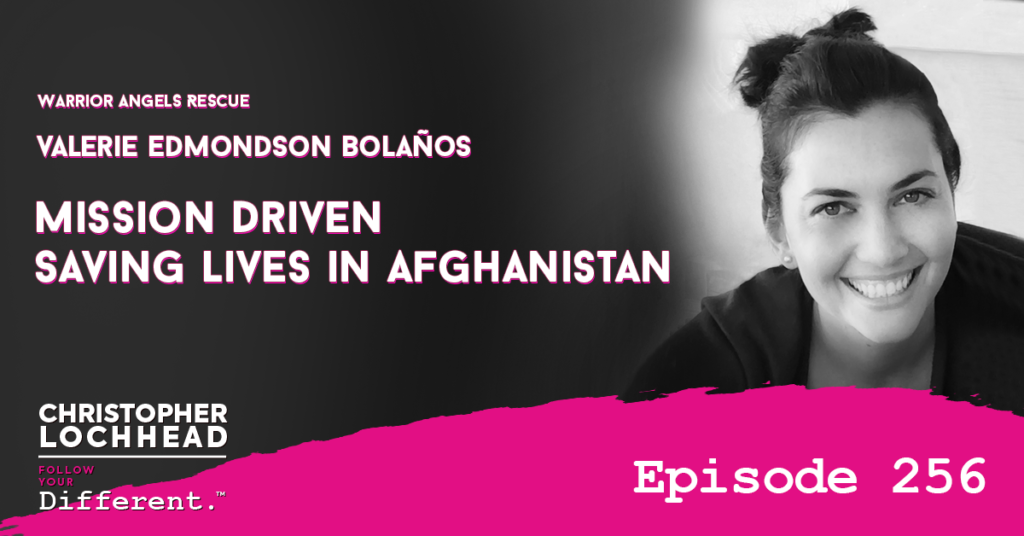
Podcast: Play in new window | Download (Duration: 1:02:55 — 43.2MB) | Embed
Subscribe: Apple Podcasts | Spotify | Pandora | RSS | More
In this episode of Christopher Lochhead: Follow Your Different, you will hear one of the most inspiring, horrifying, and yet deeply moving conversations from our guest, Valerie Edmondson Bolaños.
Valerie Edmondson Bolaños is the founder of an extraordinary NGO called Warrior Angels Rescue. She started her own NGO in the way of Hurricane Maria. It was a Category Five storm that devastated her home island of Puerto Rico back in 2017. What started off as an effort to rescue her own family grew into a much larger scale over time.
Since August of 2021, Valerie and the Warrior Angels Rescue has been evacuating girls, women, and their families from the humanitarian crisis that is escalating in Afghanistan after the United States left. What you’re about to hear is really one of the most inspiring mission-driven founders you can listen to. We hope that it moves you as well.
Valerie Edmondson Bolaños on the Afghanistan Situation
The conversation starts as Valerie gives a perspective of what the situation is in Afghanistan at this moment after the United States withdrawal last August of 2021.
“It’s pretty horrific, which should come as no surprise. We’ve noticed (that) just in the three months that we’ve been working there. It just descended from an absolutely apocalyptic situation into the depths of hell. The messages and videos that we’re receiving directly from the families that we’re helping that are in our evacuation lists are just horrifying. I’ve had nightmares, and I’m not even living through it firsthand.” – Valerie Edmondson Bolaños
These horrors stem from the local terrorist organizations who are trying to root out those who have worked with the US forces when they were still on the ground. They torture and beat them publicly, while abducting and interrogating those who they think had close ties or worked directly with the US forces.
This was on top of the different terrorist organizations jockeying for power amongst themselves, which adds another layer of suffering for those on the ground.
The Taliban Taking Away the Power
Valerie shares that are a lot of shortages on the ground. The economy has all but shut down entirely because people are in hiding. People who had decent homes and careers had to leave almost everything to stay with families that are less conspicuous.
“The Taliban is literally trying to take away power from the people who have even the slightest bit of power. And so much power comes from being educated and being having a profession. So they want to quash any potential viable resistance to their takeover by not only literally taking away power and electricity and connectivity from everyone, but they’re targeting middle class families and upper class families. So everyone’s gone into hiding, which means that most of the mechanisms that keep society going and keep the economy going are completely shut down.” – Valerie Edmondson Bolaños
While the medical care is not completely gone, it’s can still be hard to get in the current circumstances. There are simply too much people that are now relying on volunteer medical professionals who are scared but also want to save as many lives as they can.
How the Pandemic Factors In
On the topic of medical care, Valerie was asked about the COVID spread and deaths in Afghanistan. She shares that there isn’t really any visible evidence of any data being collected at this point. Not to mention any effort for vaccination programs to speak of.
“There’s no data being collected. People aren’t going to hospitals for the most part, because then they’re afraid they’ll be killed. So yeah, I don’t I don’t think any data is really coming out, or being collected. I mean, that would require a functioning government, which is not what the Taliban has created.” – Valerie Edmondson Bolaños
The pandemic really added a few levels of complication of how volunteer NGOs like the Warrior Angels Rescue can operate on the ground, as not only are you worried about getting shot, the idea of a virus ravaging the neighborhood just scares both the locals and volunteers alike. The Taliban are definitely not doing anything to alleviate it. For them, it’s just another way of keeping people in check and not banding together to take back the country.
To hear more from Valerie Edmondson Bolaños and how she and the Warrior Angels Rescue help those in dire need, download and listen to this episode. If you wish to help them in their efforts, check out the links at the end of this article.
Bio
Valerie Edmondson Bolaños
Valerie Edmondson Bolaños founded Warrior Angels Rescue in the wake of Hurricane Maria, a category 5 storm that devastated her home island of Puerto Rico in 2017.
What started out as an effort to rescue her own family quickly grew into a large-scale effort to evacuate hundreds of medical patients, pregnant mamas, and elderly people who could not survive days (let alone months) without electricity. Since then, our 100% volunteer team has responded to 5 disasters: a mudslide, an earthquake swarm, a tornado, a global pandemic, and the international border shutdowns due to COVID.
Since August of 2021, Warrior Angels Rescue has been evacuating girls, women, and their families from the humanitarian crisis unfolding in Afghanistan.
Warrior Angels Rescue has saved hundreds of lives by securing safe harbor in Ecuador and routing our evacuees through Pakistan to Canada and other countries willing to step up and help.
With a resettlement strategy founded on the principles of empowerment and synergy, Warrior Angels Rescue has developed a win/win/win solution that protects the freedom of our refugee families, benefits the local communities from our host countries, and costs the American taxpayer $0.
Links
Follow Valerie today!
Website: WarriorAngelsRescue.org | News Page: WarriorAngelsRescue.org/news
GoFundMe: Evacuate School Girls to Safety
LinkedIn: in/Valerie-Edmondson-Bolanos
More on Valerie Edmondson Bolaños and the Warrior Angels Rescue
We hope you enjoyed this episode of Follow Your Different™! Christopher loves hearing from his listeners. Feel free to email him, connect on Facebook, Twitter, Instagram, and subscribe on iTunes!
255 Security, Ransomware, Geo-Political Threats, New Domains of Warfare & “Game of Crimes” with Morgan Wright
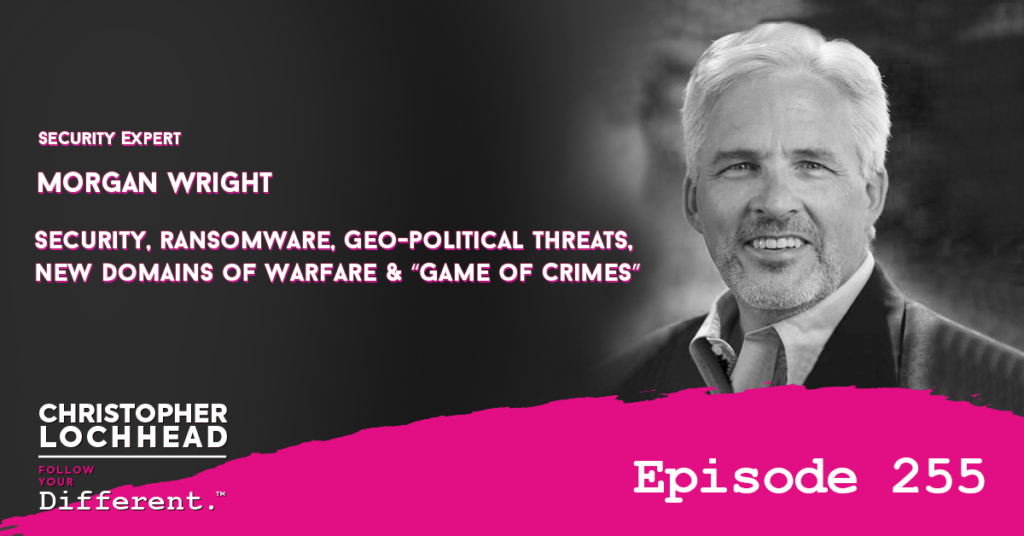
Podcast: Play in new window | Download (Duration: 1:34:46 — 65.1MB) | Embed
Subscribe: Apple Podcasts | Spotify | Pandora | RSS | More
Today on Christopher Lochhead: Follow Your Different, Morgan Wright is back to talk about all things Security: new geopolitical threats, the new domains of warfare, and how they look at evil crimes through the eyes of the legendary public servants who solve them. This is a very fun, insight-packed real conversation with one of America’s highest profile crime fighting voices.
Morgan Wright is an internationally recognized expert on cybersecurity and terrorism, identity theft, and privacy. He was also a senior adviser to the US State Department, anti-terrorism program, and a senior law enforcement adviser for the 2012 Republican National Convention. Morgan has developed solutions in defense, justice and intelligence for the largest technology companies in the world. He is now also the co-host of a red-hot new podcast called Game of Crimes. This new podcast shines a light to the men and women who serve and protect.
So if you are looking for an in-depth update on how our cybersecurity stands today, stay tuned to this episode.
Game of Crimes with Morgan Wright
We open up on the topic of Morgan’s new podcast. Game of Crimes is a podcast that he co-hosts with Steve Murphy, and it is a long-form true crime podcast.
Morgan shares that they were inspired with Follow Your Different, where they go deep into the topic and explore multiple topics related to the guests. They enjoyed the format so much that most episodes end up as two-parters, because they find a lot to explore on each guest and topic.
“Our interviews are long. When I mean (long), we’re they’re always a two–parter. So that’s actually been a fun part because it kind of gets you back into it.” – Morgan Wright
There’s a risk to doing two-parters, but the payoff is if you get people hooked, they’d have to hear both episodes to get more of their fix.
Morgan Wright on Looking at the Problem Wrong
Morgan then talks about the Cybersecurity conferences that he has attended over the years. His shares that his recent favorite opener is what Elon Musk did different to become a rich guy in the world. That is, he thought differently, and revolutionized the space industry through SpaceX.
He then explains that sometimes the problem is not the biggest problem, but the way we think about the problem.
“What I say is the problem isn’t the problem. The problem is the way we think about the problem. That’s not what counts. What really counts is the way our adversaries think about the problem. And they beat us every time because they out-think us about what to do.” – Morgan Wright
Another example he has is about bank robberies. It makes sense that if you want to beef up your security, you need to learn how the people on the other side thinks. Instead, managers and bank owners just get into their conference rooms and say what they think works, which often turns into an echo chamber of sorts.
Prevention is ALWAYS Better than a Cure
In line with this train of thought, Morgan Wright mentions that cybersecurity experts need to start looking at the problem from a different perspective. Because up until recently, the implications on cybersecurity have always been Response and Recovery. While that it all well and good, the problem with that is your systems are reactionary.
Morgan thinks that cybersecurity should be proactive, where you stop and prevent cyber attacks from happening in the first place.
“The reason we keep getting the results we have is because of the words you keep using you keep talking about Response and Recovery. That means it’s already happened to you. What you’re saying is that we should continue to buy effective fire alarms that say congrats, your house is successfully burned down. So let’s start talking about stopping and preventing. And the minute we start doing that, we will start changing what we think about the problem.” – Morgan Wright
To hear more from Morgan Wright and the current state of Cybersecurity and how the fight against cyberterrorism is done, download and listen to this episode.
Bio
Morgan Wright is an internationally recognized expert on cybersecurity strategy, cyberterrorism, identity theft and privacy.
He is President and Chief Development Officer for RadiusAI.
He currently serves as a Senior Fellow at The Center for Digital Government, and is a national security opinion contributor to TheHill.com.
Morgan’s landmark testimony before Congress on Healthcare.gov changed how the government collected personally identifiable information.
He’s made hundreds of appearances on national news, radio, print and web including CNBC, Fox News, Fox Business, CNN, ABC, NPR, NBC and more. Previously Morgan was a Senior Advisor in the US State Department Antiterrorism Assistance Program and Senior Law Enforcement Advisor for the 2012 Republican National Convention. In addition to 18 years in state and local law enforcement as a highly decorated state trooper and detective, Morgan has developed solutions in defense, justice and intelligence for the largest technology companies in the world including SAIC, Unisys, Alcatel-Lucent and Cisco.
He’s a contributing author for the 4th Edition Computer Security Handbook, and has been quoted in 2 New York Times best sellers (Sharyl Attkisson: Stonewalled and Carmine Gallow: Talk Like TED).
Links
We hope you enjoyed this episode of Follow Your Different™! Christopher loves hearing from his listeners. Feel free to email him, connect on Facebook, Twitter, Instagram and subscribe on iTunes!
254 How To Create Different Futures with Kevin Maney, Co-Author of Play Bigger & Co-Founder of Category Design Advisors
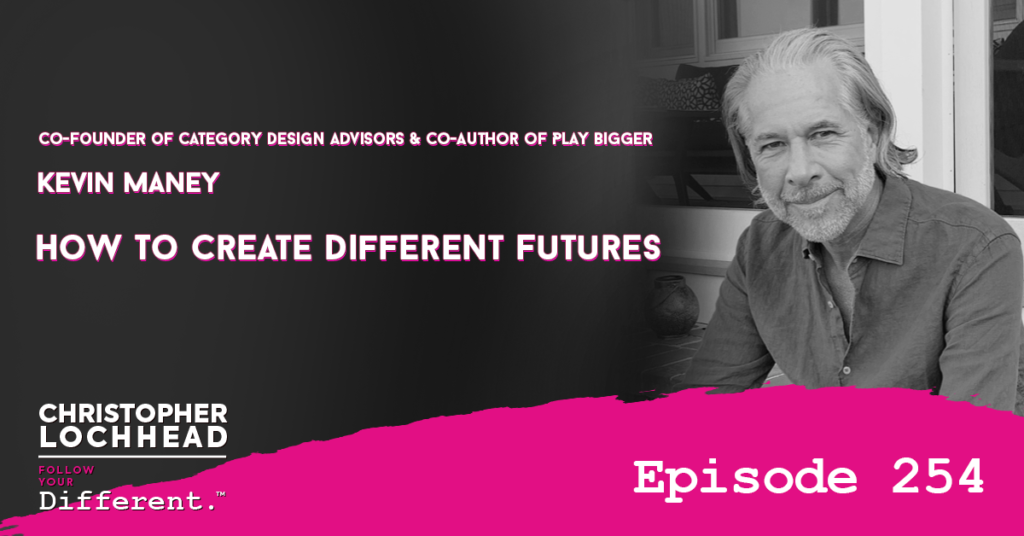
Podcast: Play in new window | Download (Duration: 1:13:19 — 50.3MB) | Embed
Subscribe: Apple Podcasts | Spotify | Pandora | RSS | More
As we all know, Context is everything. Around here, we believe that thinking about thinking is the most important kind of thinking. So if you want to design a different future, the context of your thinking matters. In this episode of Christopher Lochhead: Follow Your Different, we discuss context and much more with Kevin Maney.
Kevin Maney is the co-founder of Category Design Advisors, where he and his partners advise CEOs on how to design and dominate market categories. He is also one of the godfathers of Category Design, and one of the co-authors of Play Bigger, alongside Al Ramadan and myself.
We talk about a lot of topics that will help frame your think, and why the barriers to entry for Category Design keep dropping. We also discuss why Category Design is more important now than it was in 2006. To know why that’s the case, stay tuned to this episode.
Kevin Maney On Playing Bigger
It has been five years since Play Bigger came out, and there have been a lot of changes in Category Design over the years. Kevin suggests that they should get together again and pool together what they have learned over the years.
That said, Kevin has noticed a few things that were big drivers of why category creation and design is so important. Some of them they have touched on in Play Bigger, but did not have the bandwidth to delve deeper into. These drivers are what Kevin and the others have been explaining to CEOs over the past years, so they can be aware of how important it is in dominating the market.
Though the most obvious catalyst in the recent years has been COVID. COVID has accelerated the amount of category breakthroughs, mostly brought about by necessity.
“One of the things that always happens in these times of crisis or radical change like wars, a pandemic, or other things that truly shake up the world (is that) everybody starts doing things in different ways, or looking for new solutions. And it really opens up the possibility of creating new things and new categories that didn’t exist before, solving old problems in new ways or, or addressing problems that have never existed before that arise because of what’s going on.” – Kevin Maney
Kevin Maney on the End of Friction
In any business or market, there will always be friction present. One of the friction Kevin talks about is the friction of geography, and how that can affect the market. Because of such frictions, most people are limited to choose what is available, instead of the category leader for that market.
Fast forward to today, and those frictions are slowly being removed. Now that people have access to a wider variety of the market, they will tend to gravitate towards the category leaders of said category. Which makes aiming to be a category leader is a must now, lest you get left behind.
“The more that the friction of geography disappears, the more we can all choose the global, or at least national category leader of any particular category. So that makes it all the more important in whatever business you’re in to try to be that category leader, or you’re really just going to get sucked down the drain.” – Kevin Maney
The Prevalence of Disintermediation Today
The conversation then shifts to how different things are done today compared to just a few years back. In a way, there’s more disintermediation nowadays compared to the .com era. One of the way it’s very visible now is how we consume entertainment. With the advent of different social media platforms, normal people can interact directly with their idols, rather than having to go to concerts or shows.
On the entertainers themselves, the old formula is getting discovered and debuting on TV or film. Nowadays, people could go viral on their own efforts, or at least without the backing of a major corporation and such.
All this because we have reduced the friction required to make things possible. In the early 2000s, you’d need a lot of equipment, money, and know-how to shoot a simple video, let alone have it viewed by people. Now, all that can be done with just your smartphone.
“That’s an insane decrease in friction, and allows for the creation of these new categories. It allows for a niche player to find their audience everywhere in the world, and not just in some little location or some little pocket.” – Kevin Maney
To hear more from Kevin Maney and how you can create different futures for your business, download and listen to this episode.
Bio
Kevin Maney is cofounder of Category Design Advisors, where he works with CEOs and executive teams to develop and execute strategies to design and dominate markets. He is also a multi-time bestselling author and journalist who writes about technology and society.
His most recent book, UnHealthare: A Manifesto for Health Assurance, was co-authored with venture capitalist Hemant Taneja and Jefferson Health CEO Steve Klasko. It came out in 2020, and tees up how healthcare will evolve in the post-Covid era.
His previous book, Unscaled: How AI and a New Generation of Upstarts are Creating the Economy of the Future, was co-authored with Hemant Taneja and came out in 2018.
His book Play Bigger: How Pirates, Dreamers and Innovators Create and Dominate Markets (Harper Business, 2016), is a collaboration with Silicon Valley veterans Al Ramadan, Dave Peterson and Christopher Lochhead. The book introduces business to the idea of category design and gave birth to the advisory firm Category Design Advisors, where I’m now a partner.
He co-authored, with TIBCO CEO Vivek Ranadive, The Two-Second Advantage: How We Succeed by Anticipating the Future…Just Enough. Merging brain science and computer science, it was a 2011 New York Times bestseller, and predicted much of the conversation we’re now having about artificial intelligence.
He also co-wrote Making the World Work Better, which marked IBM’s centennial in 2001. More than 600,000 copies are in print in a dozen languages.
His other books include Trade-Off: Why Some Things Catch On, and Others Don’t, The Maverick and His Machine: Thomas Watson Sr. and the Making of IBM and Megamedia Shakeout.
Over the years, he’s been a contributor to Fortune, The Atlantic, Fast Company and ABC News, among other media outlets. He was a contributing editor at Conde Nast Portfolio during its brief run from 2007 to 2009. For 22 years, he was a columnist, editor and reporter at USA Today.
He’s appeared frequently on television and radio, including CNN, CBS Sunday Morning and NPR, and lectured at conferences and universities, including New York University, UNC in Chapel Hill, and his alma mater, Rutgers.
Kevin also plays music with other New York rockers in a band called Total Blam Blam.
Links
Follow Kevin Maney today!
Website: KevinManey.com | CategoryDesignAdvisors.com
LinkedIn: in/KevinManey | company/CategoryDesign
Facebook: fb.com/CategoryDesign
Twitter: @KManey | @CD_Advisors
Instagram: @CategoryDesign
We hope you enjoyed this episode of Follow Your Different™! Christopher loves hearing from his listeners. Feel free to email him, connect on Facebook, Twitter, Instagram, and subscribe on iTunes!
253 America’s Biggest Problem: The Lack of Authentic Dialogue
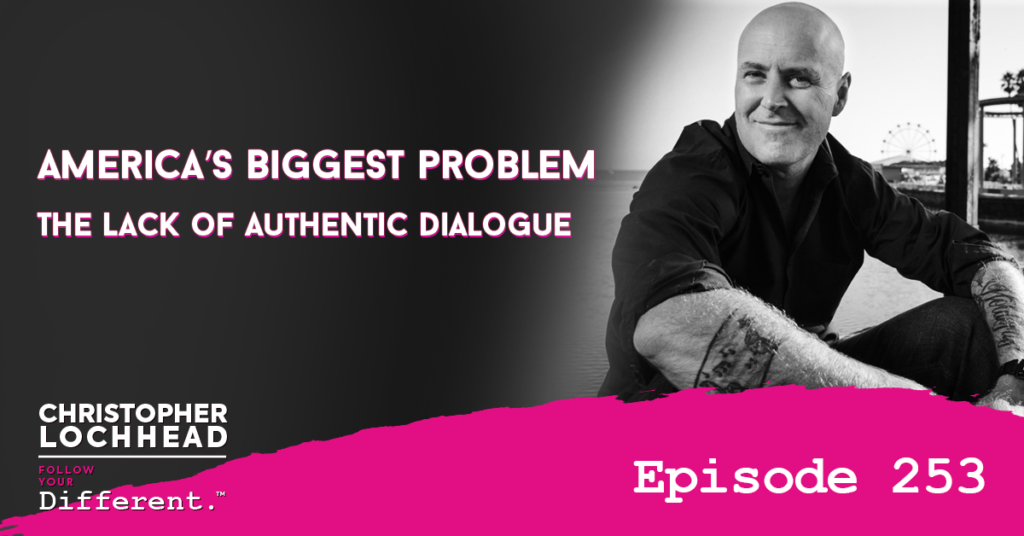
Podcast: Play in new window | Download (Duration: 6:42 — 4.6MB) | Embed
Subscribe: Apple Podcasts | Spotify | Pandora | RSS | More
In this special solo episode of Christopher Lochhead – Follow Your Different, I just want to share with you an element of conversation around the most recent Kyle Rittenhouse case. What I wanted to talk about is America’s biggest problem when it comes to situations like this. That is, the lack of any authentic dialogue about the matter.
Too Much Yelling, Not Enough Listening
Regardless on where you come out of the issue, there are some things that wasn’t properly address or we didn’t hear from at all. What I hoped we’d hear more was thoughtful, nuanced dialogue and conversation. Instead, what we got is what we’ve been getting a lot of in the United States of late, which is yelling and hardened positions. You’re only pro or anti-something. As part of that, whatever one side does, if you’re on that side, everything they do is right, and everything the other side does is wrong, and vice versa.
I think that’s really sad. Because thinking about thinking is the most important kind of thinking. And it’s only through dialogue, where human beings can achieve greater levels of understanding. There was no dialogue sparked by this horrible circumstance, horrible situation around what do we as Americans want to do about protests and riots? There wasn’t a discussion about that. Nor was there a discussion about self-defense, what do we mean by self-defense? Who decides where there’s a line where we can no longer defend ourselves or not?
“What I do know is we’re not having conversation. We’re not having dialogue. There’s a lot of yelling, and not a lot of listening.” – Christopher Lochhead
Bring Back the Willingness to Listen
If you’re a long-time listener of this podcast, you know that our mission has always been to celebrate real, authentic dialogue. In our case, dialogue around what it takes to design legendary business and legendary life. In hopes that we can bring back curiosity, we can bring back a willingness to listen, a willingness to co create our lives and ultimately, our culture and country together.
I got to tell you: sometimes, particularly of late, it feels like we’re losing that war. We might even have lost it completely, and we might never get it back. But I do know that a conversation about authentic dialogue, and why we don’t have it, and how we can have more is an important thing to do, even if very few people want to participate in that.
Bio
Christopher Lochhead is a #1 Apple podcaster and #1 Amazon bestselling co-author of books: Niche Down and Play Bigger.
He has been an advisor to over 50 venture-backed startups; a former three-time Silicon Valley public company CMO and an entrepreneur.
Furthermore, he has been called “one of the best minds in marketing” by The Marketing Journal, a “Human Exclamation Point” by Fast Company, a “quasar” by NBA legend Bill Walton and “off-putting to some” by The Economist.
In addition, he served as a chief marketing officer of software juggernaut Mercury Interactive. Hewlett-Packard acquired the company in 2006, for $4.5 billion.
He also co-founded the marketing consulting firm LOCHHEAD; the founding CMO of Internet consulting firm Scient, and served as head of marketing at the CRM software firm Vantive.
We hope you enjoyed this episode of Follow Your Different™! Christopher loves hearing from his listeners. Feel free to email him, connect on Facebook, Twitter, Instagram, and subscribe on iTunes!

